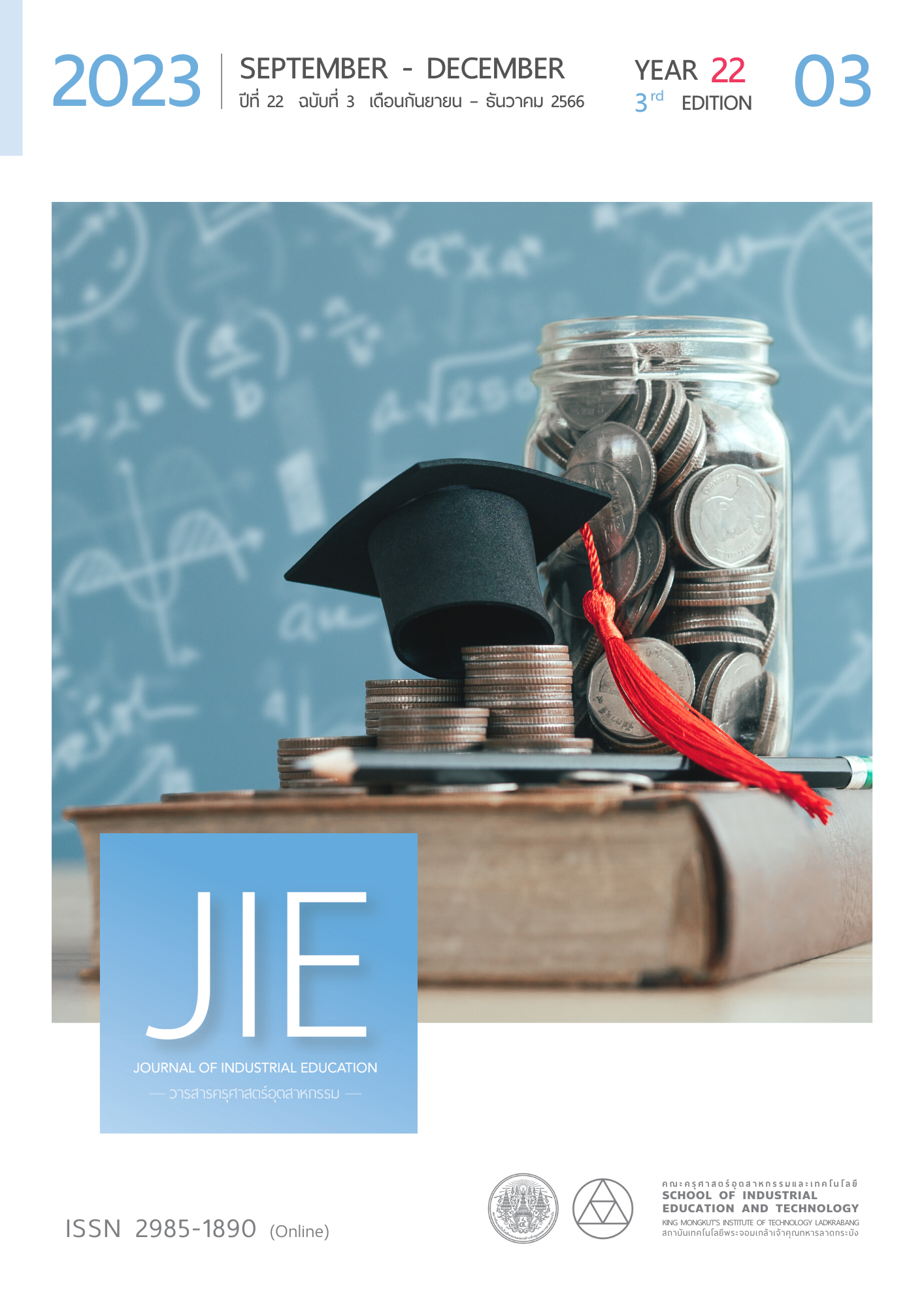การพัฒนากิจกรรมการจัดการเรียนรู้โดยประยุกต์ใช้สะเต็มศึกษา เพื่อส่งเสริมความสามารถ ในการคิดแก้ปัญหาทางวิทยาศาสตร์ สำหรับนักเรียนชั้นมัธยมศึกษาปีที่ 3
คำสำคัญ:
การจัดการเรียนรู้สะเต็มศึกษา, ความสามารถในการคิดแก้ปัญหาทางวิทยาศาสตร์, สะเต็มศึกษา, ความพึงพอใจบทคัดย่อ
การวิจัยครั้งนี้เป็นการออกแบบและพัฒนานวัตกรรม โดยใช้รูปแบบการวิจัยเชิงพัฒนา (Developmental research) แบบ Type I ซึ่งมุ่งเน้นการออกแบบและพัฒนานวัตกรรมแบ่งออกเป็น 2 ระยะ ได้แก่ กระบวนการพัฒนาและกระบวนการประเมิน ซึ่งงานวิจัยนี้อยู่ในระยะที่ 2 เครื่องมือที่ใช้ในการวิจัยประกอบด้วย 1) แผนการจัดการเรียนรู้จำนวน 6 แผน 2) แบบวัดความสามารถในการคิดแก้ปัญหาทางวิทยาศาสตร์ 3) แบบสอบถามความพึงพอใจสําหรับนักเรียน สถิติที่ใช้ในการวิเคราะห์ข้อมูล ได้แก่ ร้อยละ ค่าเฉลี่ย ส่วนเบี่ยงเบนมาตรฐาน กลุ่มตัวอย่างในการศึกษาครั้งนี้คือ นักเรียนชั้นมัธยมศึกษาปีที่ 3 ที่กำลังศึกษาในภาคการศึกษาที่ 1/2565 จำนวน 30 คน ของโรงเรียนแห่งหนึ่งในจังหวัดกาฬสินธุ์ เก็บรวบรวมข้อมูลด้วย 1) แบบวัดความสามารถในการคิดแก้ปัญหาทางวิทยาศาสตร์ จำนวน 20 ข้อ 2) แบบสอบถามความพึงพอใจ จำนวน 10 ข้อ ผลการวิจัยพบว่า 1) ผลการพัฒนากิจกรรมการจัดการเรียนรู้โดยประยุกต์ใช้สะเต็มศึกษา สำหรับนักเรียนชั้นมัธยมศึกษาปีที่ 3 มีประสิทธิภาพ 80.50/84.17 สูงกว่าเกณฑ์ที่ตั้งไว้ 80/80 2) ความสามารถในการคิดแก้ปัญหาทางวิทยาศาสตร์ หลังการจัดกิจกรรมการจัดการเรียนรู้โดยประยุกต์ใช้ สะเต็มศึกษา สำหรับชั้นมัธยมศึกษาปีที่ 3 พบว่า นักเรียนมีความสามารถในการคิดแก้ปัญหาทางวิทยาศาสตร์หลังการจัดการเรียนรู้โดยประยุกต์ใช้สะเต็มศึกษาสูงกว่าเกณฑ์ร้อยละ 70 คิดเป็นร้อยละ 77.83 3) นักเรียนมีความพึงพอใจต่อการจัดกิจกรรมการเรียนรู้โดยประยุกต์ใช้สะเต็มศึกษาอยู่ในระดับมากที่สุด ( = 4.59, SD = 1.82)
เอกสารอ้างอิง
Donhongpai, P. (2013). The effects of multimedia based on the inquiry process on substance around us on learning achievement and capability in solving scientific problems of pathomsuksa six students. Veridian E-Journal, Silpakorn University (Humanities, Social Sciences and arts), 6(1), 782-792. (in Thai)
Khamsmile, P., & Sranamkam, T. (2019). The Effects of Blended Learning with Stem Education to Enhance Science Problem Solving Thinking for Grade VIII Students. e-Journal of Education Studies, Burapha University, 1(5), 16-34. (in Thai)
Likert, R. (2017). The I mpact of Leadership Style on Middle Managers’ Motivation: A Study of the Ministry of Civil Aviation in Egypt. Journal of Business and Management Sciences. 2017, DOI: 10.12691/jbms-5-3-5, 100-107.
Munkham, S. (2004). Teaching Strategies for Problem-Solving Thinking. Bangkok: Printmaking. (in Thai)
Office of the Secretariat of the Council of Education. (2017). National Education Plan 2017–2036. Bangkok. https://www.stou.ac.th/Offices/Oaa/OaaOldPage/Professional/Train_Professional/oaaInfo/oaa/Dept/Dept04/webcur63/Rule_MUA/Plan_Inter2560-2579.pdf. (in Thai)
Panich, V. (2015). Ways to create learning for students in the 21st century. Walailak Journal of Learning Innovations, 1(2), 3-14.
Pitiporntapin, S. (2015). Learning Science and Society for the 21st Century. Samutprakan: Boss Printing. (in Thai)
Partnership for 21st Century Skills. (2015). 21st Century Learning Framework. [Online]. Retrieved January, 2023, from http://www.p21.org/our-work/p21-framework
Piaget, J. (1962). The Stage of The Intellectual Development of The Child. Thinking and Reasoning. The United of America: Penguin Book.
Singto, A. (2020). The development of stem education learningactivities to enhance problem solving thinking ability for mathayomsuksa 1. Journal of MCU Nakhondhat, 7(7), 387-398. (in Thai)
Thailand competitiveness enhancement program. Human Resource. Retrieved on Janyuary 2023. https://elibrary.tceb.or.th/getattachment/4d7d9a38-a4da-4582-8ec8-00bcd1d28ba2/6265.aspx. (in Thai)
Wangdee, L., & Bunterm, T. (2022). The effects of stem education learning management on problem-solving thinking ability and science achievement of mathayomsuksa 3 students. Journal of Graduate School Sakon Nakhon Rajabhat University, 19(86), 35-43. (in Thai)
Weir, J. J. (1974). Problem solving is everybody's problem. The Science Teacher, 41(4), 16-18.
Unkaew, S. (2018). STEM education. http://www.kids.ru.ac.th/document/KM/STEM_by_T.Somchaiunkeaw.pdf. (in Thai)
Richey, R. C., & Klein. J. D. (2007). Design and Development Research: Methods, Strategies, and Issues, Routledge, New York. https://doi.org/10.4324/9780203826034.
Vasquez, J. A., Sneider, C., and Comer, M. (2013). STEM lesson essentials integrating Science, technology, engineering, and mathematics. New Hampshire : Heinemann.
ดาวน์โหลด
เผยแพร่แล้ว
รูปแบบการอ้างอิง
ฉบับ
ประเภทบทความ
สัญญาอนุญาต
ลิขสิทธิ์ (c) 2023 วารสารครุศาสตร์อุตสาหกรรม

อนุญาตภายใต้เงื่อนไข Creative Commons Attribution-NonCommercial-NoDerivatives 4.0 International License.
"ข้อคิดเห็น เนื้อหา รวมทั้งการใช้ภาษาในบทความถือเป็นความรับผิดชอบของผู้เขียน"



